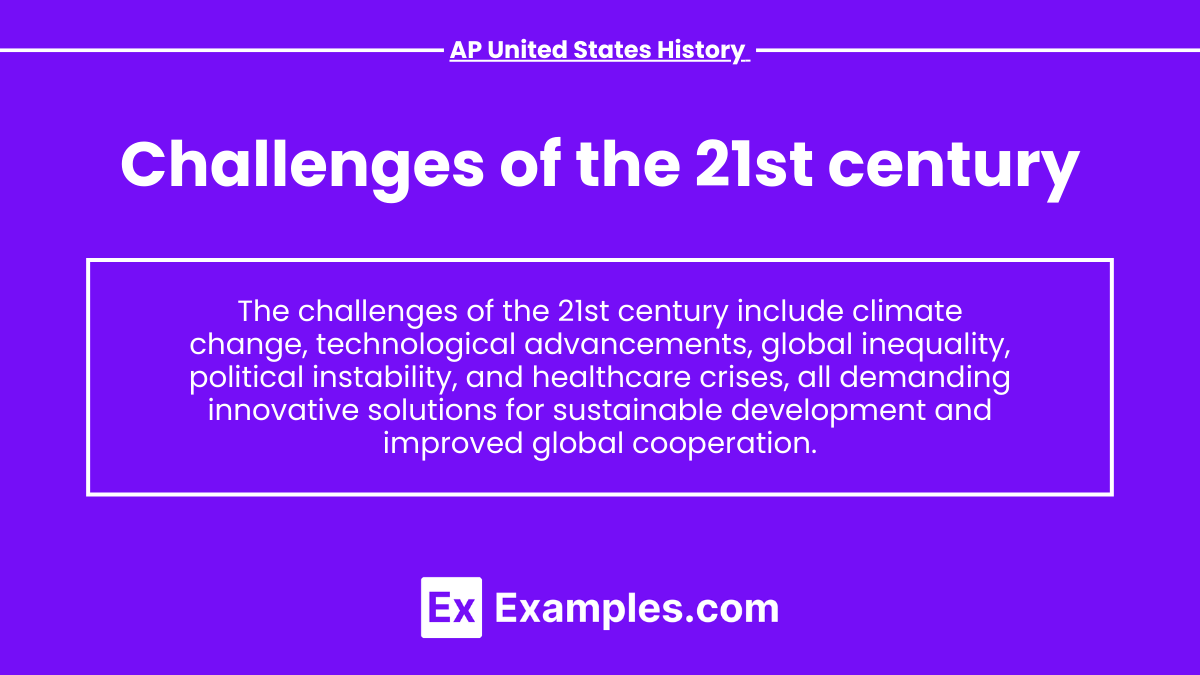The 21st century presents a complex set of challenges for the United States, ranging from terrorism and economic crises to climate change and technological advances. These issues have significantly impacted both domestic and global policies, shaping the nation’s role in international affairs while testing its social, economic, and political resilience.
Learning Objectives
Understand the major global and domestic challenges faced by the U.S. in the 21st century, including terrorism, economic instability, climate change, and shifting geopolitical dynamics. Study how these issues impacted government policies, international relations, and social movements, with a focus on the War on Terror, the Great Recession, and debates over immigration and environmental policies.
1. The War on Terror and Global Security
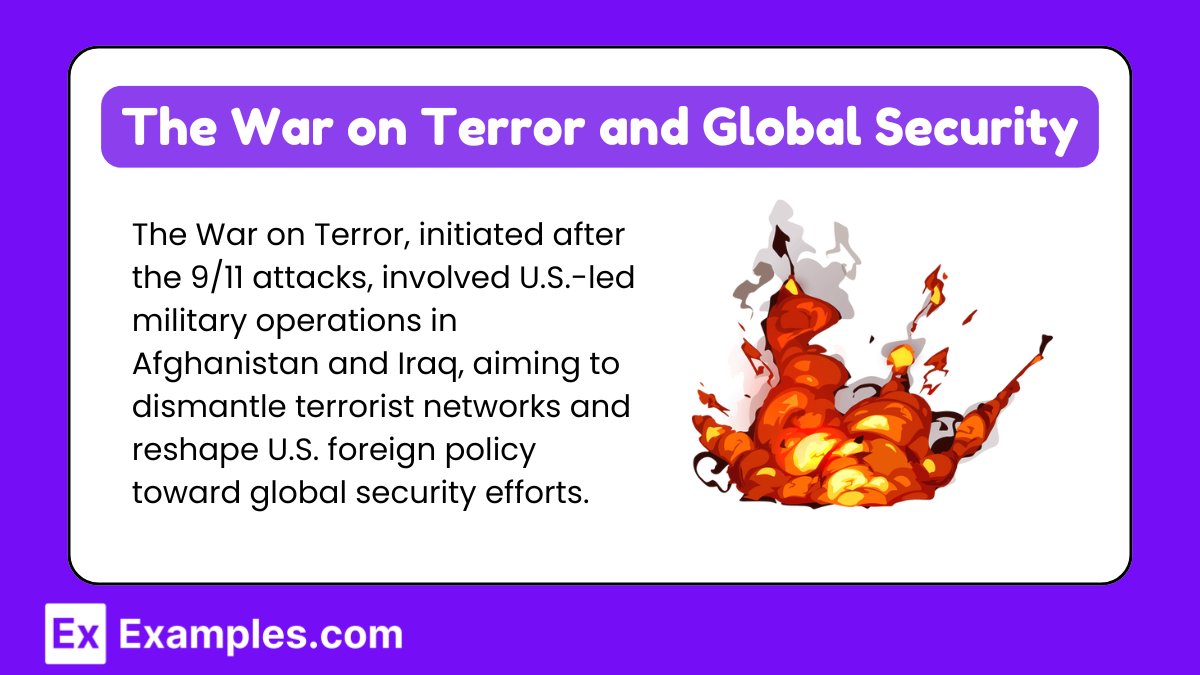
- 9/11 Attacks (2001): On September 11, 2001, Al-Qaeda terrorists attacked the World Trade Center and the Pentagon, leading to the deaths of nearly 3,000 people. This event triggered the U.S.’s War on Terror.
- U.S. Response: The Bush administration launched military campaigns in Afghanistan (2001) and Iraq (2003) to dismantle terrorist groups and prevent future attacks. This led to protracted wars, affecting U.S. foreign policy and military strategy for years.
- Impact on Civil Liberties: Post-9/11, new security measures, such as the Patriot Act, expanded surveillance powers, raising concerns over civil liberties and privacy.
- Long-Term Consequences: The War on Terror reshaped U.S. relations with the Middle East, leading to debates over military intervention, the rise of ISIS, and the refugee crisis.
2. Economic Challenges and the Great Recession
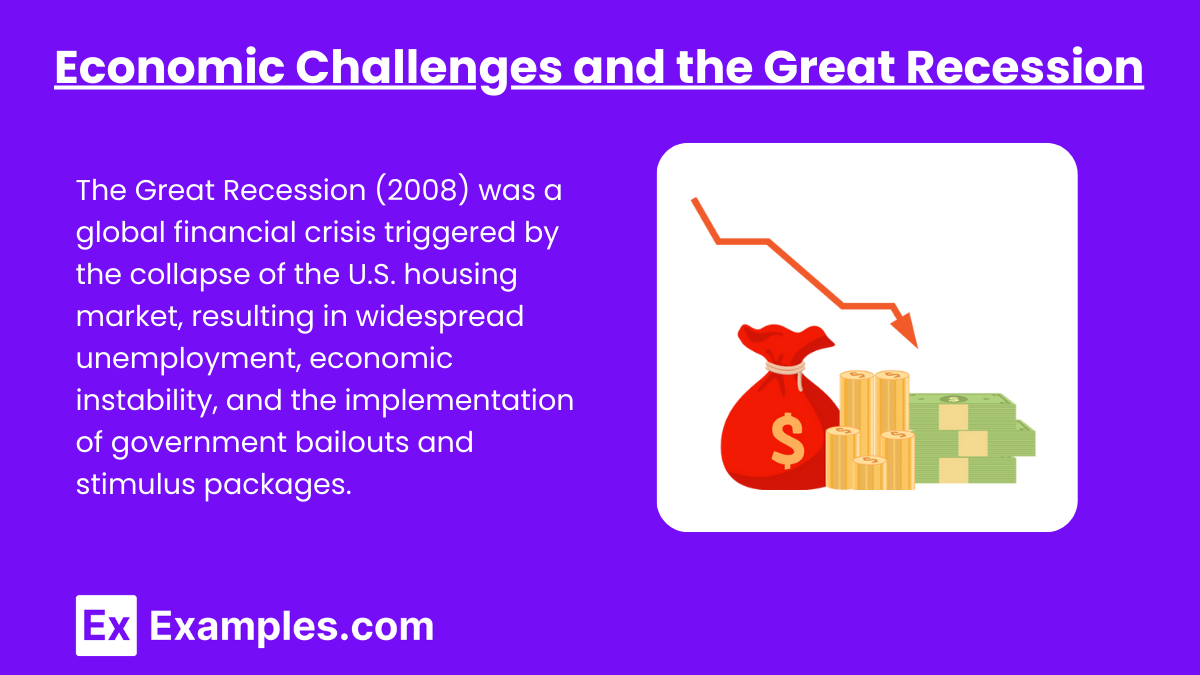
- 2008 Financial Crisis: Triggered by the collapse of the housing market and risky financial practices, this was the worst economic downturn since the Great Depression.
- Government Response: The Bush and Obama administrations implemented massive bailouts for financial institutions and economic stimulus packages to stabilize the economy.
- Long-Term Effects: The Great Recession led to widespread unemployment, housing foreclosures, and growing income inequality. Economic recovery was slow, sparking debates over regulation, corporate responsibility, and the role of government in the economy.
3. Technological Change and Its Impact
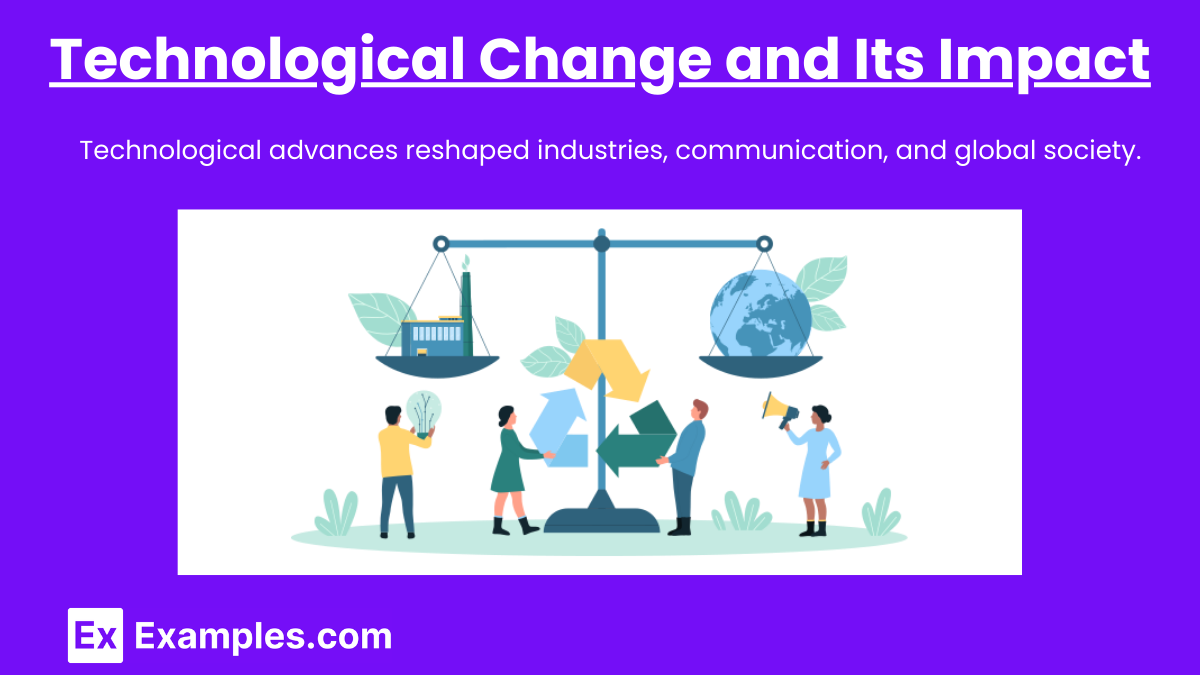
- Digital Revolution: The rise of the internet, social media, and smartphones transformed communication, commerce, and information dissemination.
- Workplace Automation: Technological advances in automation and artificial intelligence reshaped industries, causing job displacement and shifts in the labor market.
- Social and Political Impact: Social media has played a critical role in shaping public opinion and political movements, from the Arab Spring to the rise of populist leaders. It has also raised concerns over misinformation and privacy.
4. Climate Change and Environmental Challenges
- Global Warming: Increasing levels of carbon emissions have led to more frequent and severe natural disasters, including hurricanes, wildfires, and floods.
- U.S. Response: Policies like the Paris Agreement (2015) aimed to curb emissions and promote clean energy. The U.S.’s role in climate change negotiations has shifted with changing administrations.
- Debates: Climate change policies have sparked debates over economic growth, environmental regulations, and the energy industry, especially concerning coal, oil, and renewable energy.
5. Immigration and Demographic Shifts
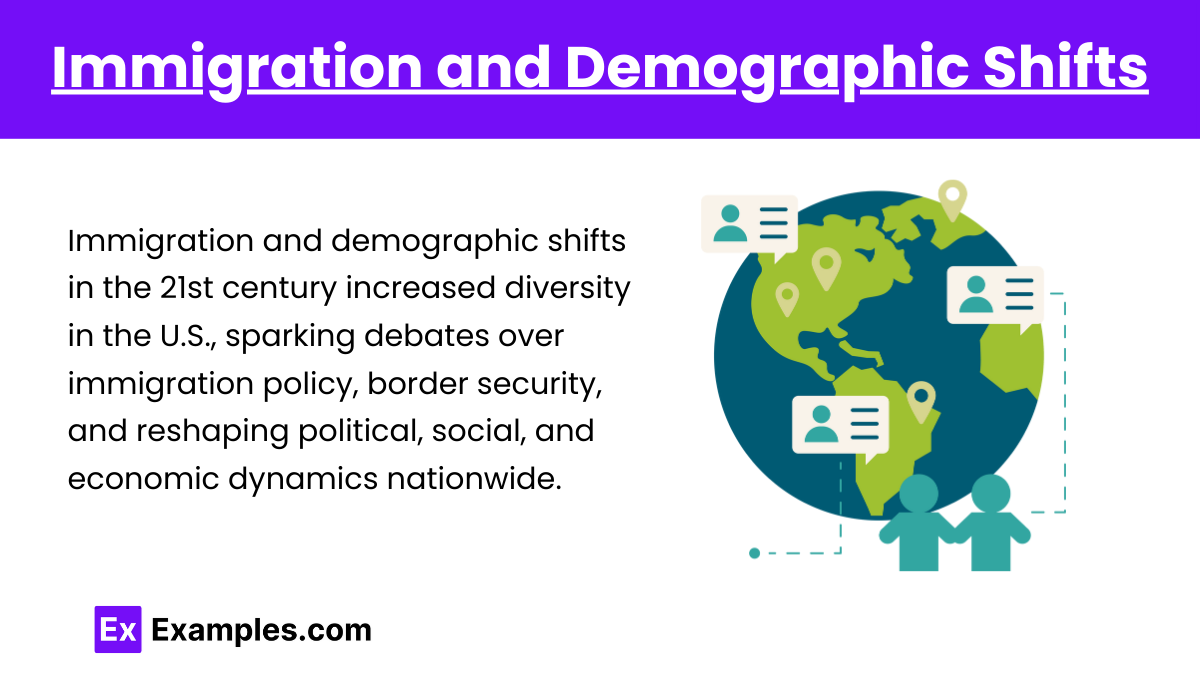
- Immigration Policy: Immigration has been a contentious issue, especially concerning undocumented immigrants and border security. Policies such as Deferred Action for Childhood Arrivals (DACA) aimed to provide protections for young immigrants.
- Border Security: Debates over border walls, deportations, and immigration reform have polarized American politics. The Trump administration took a hardline stance on immigration, intensifying these debates.
- Demographic Changes: The U.S. population has become more diverse, with increasing Hispanic and Asian communities. This demographic shift is reshaping political, social, and economic dynamics.
6. Social Movements and Political Polarization
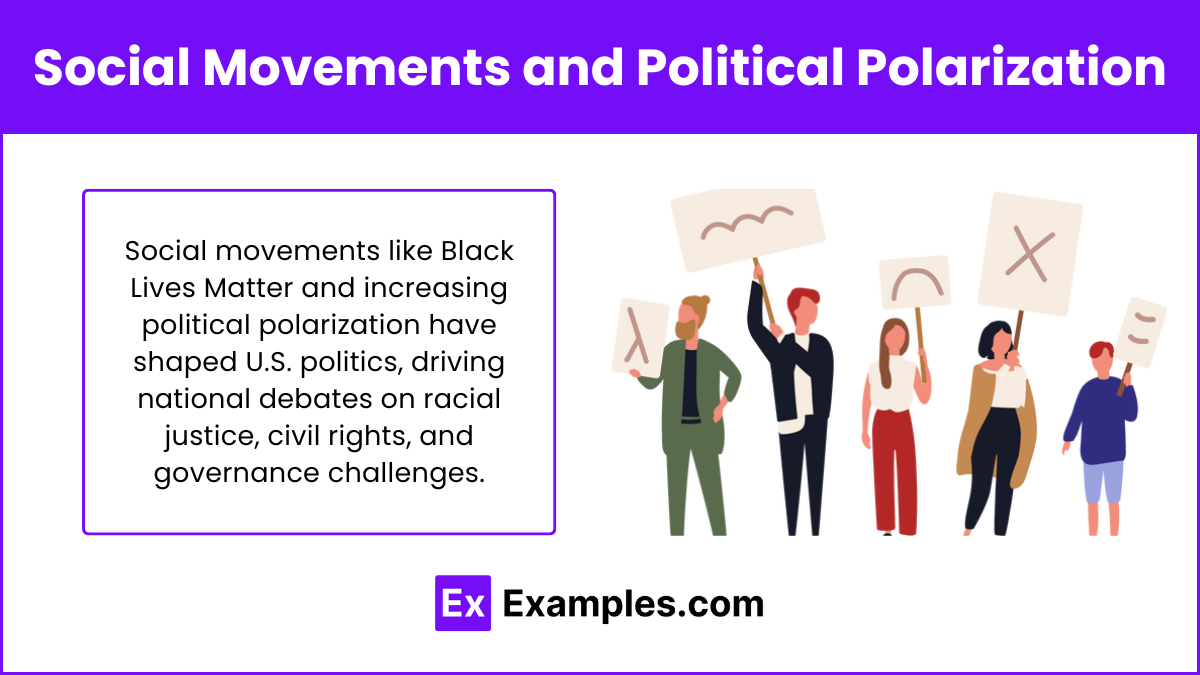
- Black Lives Matter (BLM): Sparked by incidents of police violence against African Americans, the BLM movement seeks to address systemic racism and inequality. It has fueled national conversations on police reform, racial justice, and civil rights.
- LGBTQ+ Rights: The legalization of same-sex marriage (2015) and increasing visibility of LGBTQ+ issues have been significant milestones. However, debates over transgender rights and anti-discrimination protections continue.
- Political Polarization: The 21st century has seen increasing political division, fueled by cultural issues, economic inequality, and media fragmentation. Polarization has impacted governance, making bipartisan cooperation more difficult.
Examples
- Terrorism and Global Security Threats: The 9/11 attacks and the subsequent War on Terror.
- The Great Recession (2008): Global financial crisis causing economic instability.
- Climate Change: Rising global temperatures and increased frequency of natural disasters.
- Technological Disruption: Automation, artificial intelligence, and digital privacy concerns.
- Political Polarization: Increased division in U.S. politics, fueled by social media and cultural issues.
1. Which of the following events directly led to the U.S. initiating the War on Terror?
- A) The financial collapse of 2008
- B) The fall of the Soviet Union
- C) The 9/11 terrorist attacks
- D) The Arab Spring
Answer: C) The 9/11 terrorist attacks
Explanation: The 9/11 attacks in 2001 prompted the U.S. to begin the War on Terror, focusing on global terrorism.
2. What was the primary cause of the 2008 Great Recession in the U.S.?
- A) The dot-com bubble burst
- B) The collapse of the housing market
- C) The rise of social media
- D) Natural disasters
Answer: B) The collapse of the housing market
Explanation: The 2008 Great Recession was triggered by the collapse of the housing market due to risky financial practices.
3. Which international agreement did the U.S. join to address climate change in the 21st century?
- A) Kyoto Protocol
- B) Paris Agreement
- C) NAFTA
- D) WTO Agreement
Answer: B) Paris Agreement
Explanation: The U.S. joined the Paris Agreement in 2015 to combat climate change by reducing carbon emissions globally.

